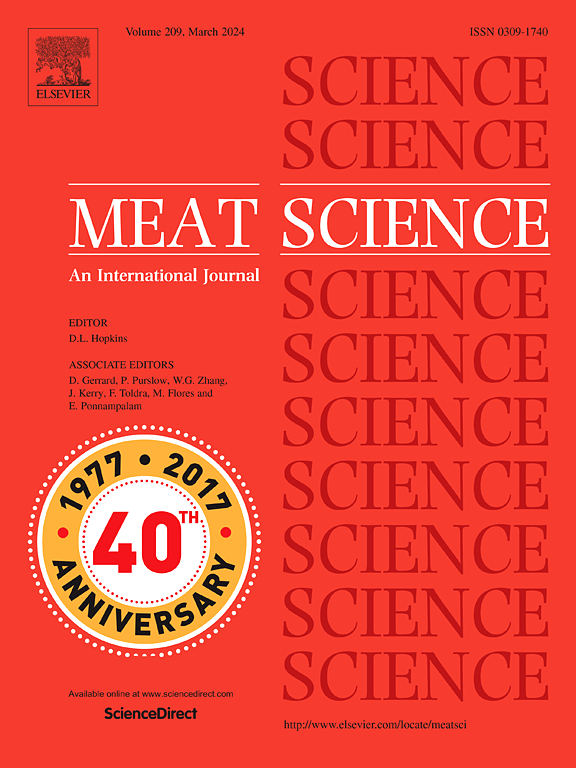保护瘤胃甜菜碱对肥育羔羊长时间冷冻期间腰最长肌品质特性的剂量依赖性影响
IF 6.1
1区 农林科学
Q1 Agricultural and Biological Sciences
引用次数: 0
摘要
本试验研究了在延长冷冻贮藏期间,添加保护瘤胃甜菜碱(RPB)对育肥羔羊腰最长肌(LL)品质特性的影响。育肥期结束后,随机选取32只羔羊进行肉质分析。试验组分别为:(1)CTRL(对照组):不添加饲粮RPB;(2) RPBL:每头每天2克RPBL;(3) RPBM:每头每天4 g RPBM;(4)膘重:育肥期每头每天6 g膘重。将肉类样品在- 18°C下保存长达9个月,并在不同时间点分析其理化性质,包括颜色、保水能力(WHC)、滴漏损失、蒸煮损失、华纳-布拉茨勒剪切力(WBSF)、脂质过氧化和抗氧化酶活性。补充RPB可改善WHC (P <;0.05), RPBH组在整个贮藏过程中细胞内水分保持率最高。rpb补充组(尤其是RPBM和RPBH)的滴漏和蒸煮损失显著降低,表明蛋白质稳定性提高,氧化损伤减少。此外,RPB的补充提高了肉的嫩度,这一点可以从处理组较低的体重增重值中得到证明(P <;0.05)。总的来说,本研究强调了RPB作为一种功能性饲料添加剂,在冷冻条件下可以提高肉类品质并延长货架期。未来的研究应从氧化应激标志物和蛋白水解酶活性等方面探索RPB的分子机制,进一步阐明其在肉类保鲜中的作用。本文章由计算机程序翻译,如有差异,请以英文原文为准。
Dose-dependent effects of rumen-protected betaine on the quality characteristics of longissimus Lumborum muscle in fattening lambs during extended freezing storage
This study investigated the effects of rumen-protected betaine (RPB) supplementation on the quality attributes of Longissimus lumborum (LL) muscle in fattening lambs during extended frozen storage. Following the fattening period, 32 lambs were randomly selected for meat quality analysis. The experimental groups were as follows: (1) CTRL (control): no dietary RPB; (2) RPBL: 2 g RPB per head per day; (3) RPBM: 4 g RPB per head per day; and (4) RPBH: 6 g RPB per head per day, during the fattening period. Meat samples were stored at −18 °C for up to nine months, and physicochemical properties, including color, water-holding capacity (WHC), drip loss, cooking loss, Warner-Bratzler shear force (WBSF), lipid peroxidation, and antioxidant enzyme activities, were analyzed at different time points. RPB supplementation improved WHC (P < 0.05), with the RPBH group exhibiting the highest retention of intracellular water throughout storage. Drip and cooking losses were markedly reduced in the RPB-supplemented groups, particularly RPBM and RPBH, indicating improved protein stability and reduced oxidative damage. Additionally, RPB supplementation enhanced meat tenderness, as evidenced by lower WBSF values in treated groups (P < 0.05). Overall, this study highlights RPB as a functional feed additive that enhances meat quality and extends shelf life under frozen conditions. Future research should explore the underlying molecular mechanisms, including oxidative stress markers and proteolytic enzyme activity, to further elucidate RPB's role in meat preservation.
求助全文
通过发布文献求助,成功后即可免费获取论文全文。
去求助
来源期刊

Meat Science
工程技术-食品科技
CiteScore
12.60
自引率
9.90%
发文量
282
审稿时长
60 days
期刊介绍:
The aim of Meat Science is to serve as a suitable platform for the dissemination of interdisciplinary and international knowledge on all factors influencing the properties of meat. While the journal primarily focuses on the flesh of mammals, contributions related to poultry will be considered if they enhance the overall understanding of the relationship between muscle nature and meat quality post mortem. Additionally, papers on large birds (e.g., emus, ostriches) as well as wild-captured mammals and crocodiles will be welcomed.
 求助内容:
求助内容: 应助结果提醒方式:
应助结果提醒方式:


